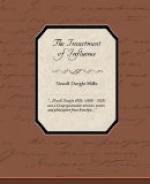With God also penalties are warnings. His punishments are thorn hedges, safeguarding man from the thorns and thickets where serpents brood, and forcing his feet back into the ways of wisdom and peace. For man’s integrity and happiness, therefore, conscience smites and is smiting unceasingly. Therefore, Eugene Aram dared not trust himself out under the stars at night, for these stars were eyes that blazed and blazed and would not relent. But why did not the murderer, Eugene Aram, forgive himself? When Lady Macbeth found that the water in the basin would not wash off the red spots, but would “the multitudinous seas incarnadine,” why did not Macbeth and his wife forgive each other? Strange, passing strange, that Shakespeare thought volcanic fires within and forked lightning without were but the symbols of the storm that breaks upon the eternal orb of each man’s soul. If David cannot forgive himself, if Peter cannot forgive Judas, who can forgive sins? “Perhaps the gods may,” said Plato to Socrates. “I do not know,” answered the philosopher. “I do not know that it would be safe for the gods to pardon.” So the poet sends Macbeth out into the black night and the blinding storm to be thrown to the ground by forces that twist off trees and hiss among the wounded boughs and bleeding branches.
For poor Jean Valjean, weeping bitterly for his sins, while he watched the boy play with the buttercups and prayed that God would give him, the red and horny-handed criminal, to feel again as he felt when he pressed his dewy cheek against his mother’s knee—for Jean Valjean is there no suffering friend, no forgiving heart? Is there no bosom where poor Magdalene can sob out her bitter confession? What if God were the soul’s father! What if he too serves and suffers vicariously! What if his throne is not marble but mercy! What if nature and life do but interpret in the small this divine principle existing in the large in him who is infinite! [1] What if Calvary is God’s eternal heartache, manifest in time! What if, sore-footed and heavy-hearted, bruised with many a fall, we should come back to the old home, from which once we fled away, gay and foolish prodigals! The time was when, as small boys and girls, with blinding tears, we groped toward the mother’s bosom and sobbed out our bitter pain and sorrow with the full story of our sin. What if the form on Calvary were like the king of eternity, toiling up the hill of time, his feet bare, his locks all wet with the dew of night, while he cries: “Oh, Absalom! my son, my son, Absalom!” What if we are Absalom, and have hurt God’s heart! Reason staggers. Groping, trusting, hoping, we fall blindly on the stairs that slope through darkness up to God. But, falling, we fall into the arms of Him who hath suffered vicariously for man from the foundation of the world.




